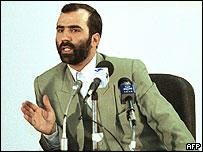Prominent Iranian judge shot dead
 An Iranian judge involved in several high-profile political cases has been shot dead in Tehran.
An Iranian judge involved in several high-profile political cases has been shot dead in Tehran.Hassan Moghaddas was leaving work when he was targeted by a gunman on a motorcycle, police said.
The motive was unclear, but the judge's past cases would be looked at for clues, Tehran's police chief said.
Mr Moghaddas was the judge in the trial of Iran's best-known political prisoner, journalist Akbar Ganji - who is currently on hunger strike.
Mr Ganji was jailed five years ago for linking senior Iranian officials to the murders of prominent intellectuals.
He has been refusing food for 53 days in protest at his imprisonment, and is said by his family to be close to death.
'Settling of accounts'
Tehran's police commander, Morteza Talaie, told journalists Mr Moghaddas was shot dead as he left work at the Islamic guidance judiciary building at around midday.
"An individual on a motorbike passed at his height when he was driving and fired two shots into his head with a pistol. The first killed him. The murderer then fled," he said.
Mr Talaie said a criminal investigation had begun to find those responsible.
"Generally this kind of act is either some mad gesture or a settling of accounts," he said.
Mr Moghaddas - also referred to in Iranian media as Massoud Moghaddas - has been involved in a number of high-profile cases involving human rights or freedom of speech.
He sentenced Mr Ganji to six years in prison in 2001 after the journalist accused members of the conservative establishment of being responsible for the killing of dissidents and intellectuals.
He was recently asked by lawyers of the family of Iranian-Canadian journalist Zahra Kazemi - who died in Iranian custody two years ago - to give evidence in court as a witness to her death.
The judiciary rejected the request.
Akbar Ganji's trial and imprisonment has been seen as part of a wider struggle between Iran's reformist movement, led by former President Mohammed Khatami, and conservative clerics and the judiciary.
The US, EU and international human rights organisations have called for Mr Ganji's release.
Mr Ganji's wife, Masoumeh Shafiei, says the authorities have pledged never to release her husband unless he withdraws his accusations and apologises to Iran's supreme leader, Ayatollah Khamenei.
http://news.bbc.co.uk/2/hi/middle_east/4738951.stm




0 Comments:
Post a Comment
<< Home